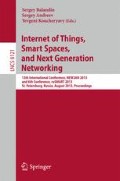Abstract
Small-cell, open capacity sharing scenarios in Cognitive Radio (CR) environments are studied from a game theoretical (GT) perspective. Simultaneous capacity requests in small-cell scenarios are modelelled as strategic interactions between CRs and analysed as resource access games. CR capacity access competition is modelled based on discrete reformulations of the Bertrand GT model. Detected equilibria describe stable game situations. Numerical simulations identify situations where Nash equilibrium (NE) is both fair and Pareto efficient or where there are multiple NE solutions to choose from, indicating a flexible range for CR strategies. Adding to the analysis are the joint Nash-Pareto solutions (intermediate between Nash and Pareto) capturing heterogeneous behaviour of players. Stable and equitable states are detected even when players have different biases.
Access this chapter
Tax calculation will be finalised at checkout
Purchases are for personal use only
Preview
Unable to display preview. Download preview PDF.
References
Akyildiz, I.F., Lee, W.-Y., Vuran, M.C., Mohanty, S.: Next generation/dynamic spectrum access/cognitive radio wireless networks: a survey. Comput. Netw. 50(13), 2127–2159 (2006)
DiBenedetto, M.-G., DiBenedetto, M.D., Guerino, G., DeSantis, E.: Analysis of cognitive radio dynamics. In: Hossain, E., Bhargava, V. (eds.) Cognitive Wireless Communication Networks, pp. 425–438. Springer US (2007)
Neel, J., Buehrer, R.M., Reed, B.H., Gilles, R.P.: Game theoretic analysis of a network of cognitive radios. In: The 2002 45th Midwest Symposium on Circuits and Systems, MWSCAS 2002, vol. 3, pp. 409–412 (2002)
MItola, J.: Cognitive radio: An integrated agent architecture for software defined radio. PhD thesis, Royal Inst. Technol (KTH), Stockholm (2000)
Doyle, L.E.: Essentials of Cognitive Radio. Cambridge U.P (2009)
Nokia Siemens Networks White paper, Liquid radio. Let traffic waves flow most efficiently (2011)
Alcatel Lucent Technology White paper, Light Radio (2011)
da Costa, G.W.O., Cattoni, A.F., Kovacs, I.Z., Mogensen, P.E.: A fully distributed method for dynamic spectrum sharing in femtocells. In: 2012 IEEE Wireless Communications and Networking Conference Workshops (WCNCW), pp. 87–92 (2012)
da Costa, G.O.W., Cattoni, A.F., Kovacs, I.Z., Mogensen, P.E.: Scalable spectrum sharing mechanism for local area networks deployment. IEEE Trans. on Veh. Technol. 59(4), 1630–1645 (2010)
Sodagari, S., Bilen, S.G.: On cost-sharing mechanisms in cognitive radionetworks. Eur. Trans. Telecomm. 22, 515–521 (2011)
Neel, J.: Analysis and Design of Cognitive Radio Networks and Distributed Radio Resource Management Algorithms. PhD thesis, Faculty of the Virginia Polytechnic Institute and State University (2006)
Xiao, Y., Bi, G., Niyato, D., da Silva, L.A.: A hierarchical game theoretic framework for cognitive radio networks. IEEE J. Sel. Area. Comm. 30(10), 2053–2069 (2012)
MacKenzie, A.B., Wicker, S.B.: Game theory in communications: motivation, explanation, and application to power control. In: Global Telecommunications Conference, GLOBECOM 2001, vol. 2, pp. 821–826. IEEE (2001)
Maskery, M., Krishnamurthy, V., Qing, Z.: Game theoretic learning and pricing for dynamic spectrum access in cognitive radio. In: Hossain, E., Bhargava, V. (eds.) Cognitive Wireless Communication Networks, pp. 303–325. Springer US (2007)
Huang, J.W., Krishnamurthy, V.: Game theoretic issues in cognitive radio systems. J. of Comm. 4, 790–802 (2009)
Niyato, D., Ekram, H.: Microeconomic models for dynamic spectrum management in cognitive radio networks. In: Hossain, E., Bhargava, V. (eds.) Cognitive Wireless Communication Networks, pp. 391–423. Springer US (2007)
Wang, B., Yongle, W., Liu, K.J.R.: Game theory for cognitive radio networks: An overview. Comput. Netw. 54(14), 2537–2561 (2010)
Etkin, R., Parekh, A., Tse, D.: Spectrum sharing for unlicensed bands. IEEE J. Select. Areas Comm., 517–528 (2007)
Bertrand, J.: Book review of theorie mathematique de la richesse sociale and of recherches sur les principles mathematiques de la theorie des richesses. J. de Savants 67, 499–508 (1883)
Osborne, M.J.: An Introduction to Game Theory. Oxford University Press (2009)
Lung, R.I., Dumitrescu, D.: Computing Nash equilibria by means of evolutionary computation. Int. J. of Comput., Commun. & Control 3, 364–368 (2008)
Dumitrescu, D., Lung, R.I., Mihoc, T.D.: Generative relations for evolutionary equilibria detection. In: 11th Annual Conference on Genetic and Evolutionary Computation, pp. 1507–1512 (2009)
Fudenberg, D., Tirole, J.: Multiple Nash Equilibria, Focal Points, and Pareto Optimality, Game Theory. MIT Press (1983)
Nash, J.F.: Non-cooperative games. Annals of Mathematics 54, 286–295 (1951)
Dumitrescu, D., Lung, R.I., Mihoc, T.D.: Evolutionary Equilibria Detection in Non-cooperative Games. In: Giacobini, M., et al. (eds.) EvoWorkshops 2009. LNCS, vol. 5484, pp. 253–262. Springer, Heidelberg (2009)
Hotelling, H.: Stability in competition. The Economic Journal 39, 41–57 (1929)
Cremene, L.C., Dumitrescu, D.: Analysis of cognitive radio scenes based on non-cooperative game theoretical modelling. IET Communications 6(13), 1876–1883 (2012)
Cremene, L.C., Dumitrescu, D., Nagy, R., Cremene, M.: Game theoretical modelling for dynamic spectrum access in TV whitespace. In: 6th International ICST Conference on Cognitive Radio Oriented Wireless Networks and Communications, CROWNCOM, pp. 336–340 (2011)
Cremene, L.C., Dumitrescu, D., Nagy, R., Gaskó, N.: Cognitive radio simultaneous spectrum access/ one-shot game modelling. In: IEEE, IET International Symposium on Communication Systems, Networks and Digital Signal Processing, CSNDSP 2012, pp. 1–6 (2012)
Author information
Authors and Affiliations
Editor information
Editors and Affiliations
Rights and permissions
Copyright information
© 2013 Springer-Verlag Berlin Heidelberg
About this paper
Cite this paper
Cremene, L.C., Gaskó, N., Cremene, M., Dumitrescu, D. (2013). A Game Theoretical Perspective on Small-Cell Open Capacity Sharing in Cognitive Radio Environments. In: Balandin, S., Andreev, S., Koucheryavy, Y. (eds) Internet of Things, Smart Spaces, and Next Generation Networking. ruSMART NEW2AN 2013 2013. Lecture Notes in Computer Science, vol 8121. Springer, Berlin, Heidelberg. https://doi.org/10.1007/978-3-642-40316-3_22
Download citation
DOI: https://doi.org/10.1007/978-3-642-40316-3_22
Publisher Name: Springer, Berlin, Heidelberg
Print ISBN: 978-3-642-40315-6
Online ISBN: 978-3-642-40316-3
eBook Packages: Computer ScienceComputer Science (R0)

